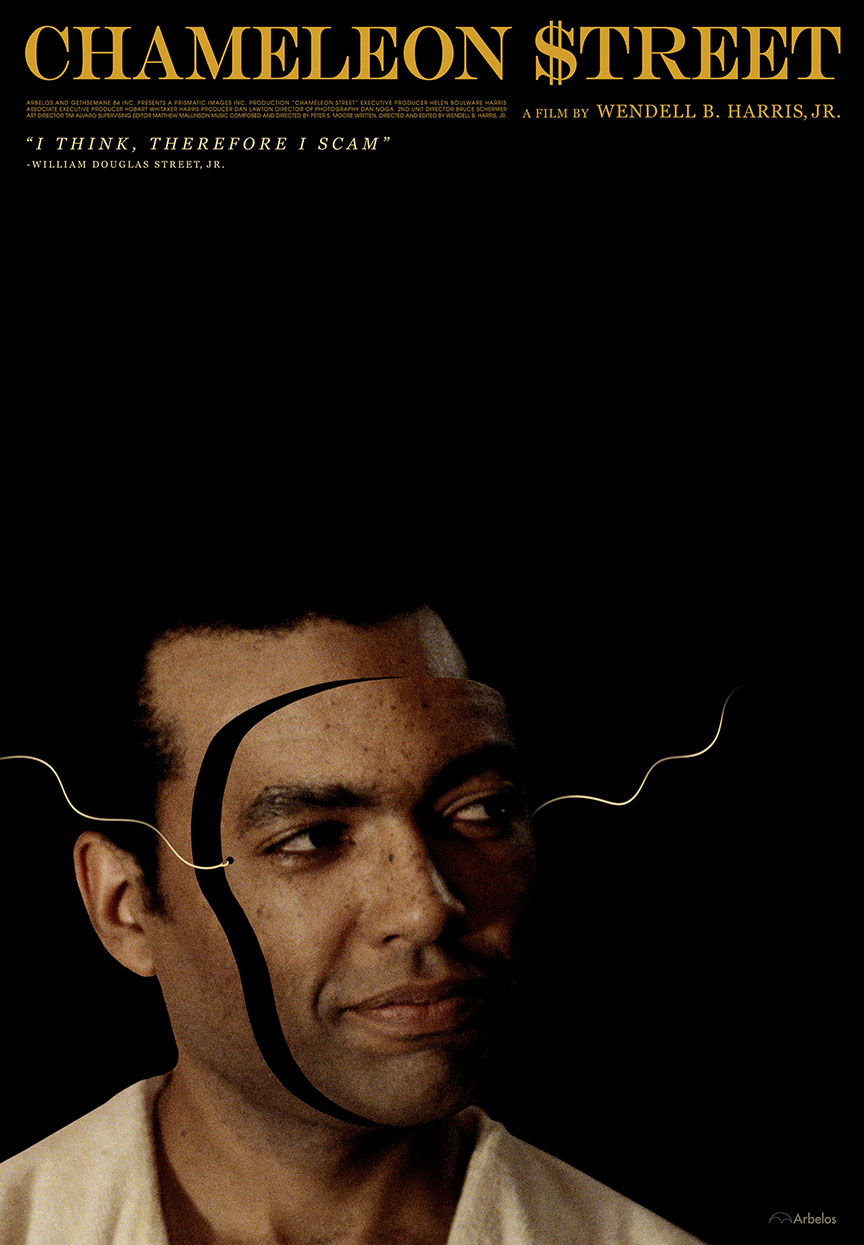
“I Think, Therefore, I Scam.”
“Chameleon Street was not concocted by me… and the result is on-screen,” explains Harris, who interviewed Street off and on for three years, at all times of day, using video, audio, phone, and snail mail letters. “I did not sit down and think up situations and dialogue. Much of the dialogue comes from Doug.”
Chameleon Street takes the inner life of a conman and morphs it into a multi-chapter adventure. Under Harris’ craft and care, the cons are largely thrilling or comedic, though some viewers certainly experience the occasional dash of horrifying. Personally, I find it hard to bestow any truly harsh judgments upon Street, because the guy is just so unapologetically himself — even as he is, ironically, masquerading as everyone else.
“What I thought about was what Doug agreed to, which was to shine a light on his persona and experiences,” explains Harris. “A very harsh light, often, but a bright, bright light. And he was as honest as he wanted to be. I think everybody is more or less as honest as they want to be.”
Indeed, one of Chameleon Street‘s fascinating core truths is that its main character, a conman, might very well be an unreliable narrator. Harris, as screenwriter, embraced this limitation.
“One of the things Doug ended up hating is the promo use of [is], “I think, therefore I scam,’ on the movie posters and in the marketing,” Harris remarks. “And I had to remind Doug: you’re the one that said that. You’re just being quoted.”
Though Chameleon Street features a colorful rotating cast of characters, no one referenced in the film — whether wife, lover, coworker, friend, or foe — was ever interviewed about their side of the story. Every anecdote came solely from the mouth and mind of Street, who Harris portrays on-screen so charismatically that it is difficult to find him unlikable, whether he cheats on his partners or illegally performs operations on unsuspecting patients.
“I don’t think he wants to hurt people, but people end up being hurt by his stated destiny, which is to constantly dissect and eviscerate all the rules and regs that are tied down racially,” Harris says, of Street’s motivations. “He actually gets a charge when he succeeds at some impersonation. The woman who finds out that her surgeon never got past high school, and yet, he cut her open and performed surgery on her: she feels violated, and Doug feels vindicated.”





Far Beyond Hollywood
As Harris tells Indiewire, “I would go to people, and say, ‘Hey, I’ve got a great idea for a satirical comedy called Negropolis. It takes place in ancient Rome, except that black people are the upper class, including the Emperors and the ruling class. All the slaves are white.’ I would pitch that, and they would look at me like I had defecated on their carpet.”
In the three decades between 1990 and 2021, Chameleon Street has garnered rave reviews by critics, yet remained essentially lost in the sands of time. With its distribution suppressed by mainstream media and gatekeepers, the film was kept alive by independent film lovers, through art house cinemas, schools, community screenings, and the like. Arbelos Films’ 4K restoration marks the beginning of a new period for Chameleon Street, which will soon have plans for streaming and virtual distribution.
This second life for the film also offers Harris a platform to speak about the projects he is working on now. They include a miniseries entitled Dr. Memory Bogarde’s Black Wax Museum, which follows the evolution of two enterprising, entrepreneurial Black families from the 1700s, who record every atrocity committed by whites against blacks in America, and a documentary entitled, Yeshua vs. Frankenstein in 3-D/G-Speak. At least partially about how racist European art and media has been used to skew history and suppress people of color across hundreds of years, Yeshua vs. Frankenstein also bears a fabulous, tell-all subtitle: “How Teddie Adorno And His Heathen Venetians Used Media To Cancel The Christ, Control The Crowd, And Color Code The Globe.”
As Harris details his new projects, I can feel both disdain and purpose behind his voice. He has oft-spoken regretfully of his three failed years in Hollywood, but what is top of my mind is the three years leading up to Chameleon Street, when Harris continued to interview Douglas Street and went through 36 script revisions. These changes were not because the story needed more material, per se, but because Harris was a young Black filmmaker from Flint, embarking on his first narrative feature film. The funds were hard to raise, so he used that time to fine-tune.
“Filmmaking is the most expensive medium on the planet,” says Harris, who cites his brothers and parents as his number one supporters. His parents invested $580,000 into the $1.3 million budget, and beyond that, “approximately a quarter of a million dollars was from Black investors. That took three years to pull together.”
It crosses my mind that — yes, Chameleon Street‘s trajectory is yet another example of Hollywood’s failure to invest in a young Black filmmaker — but there is also a less acknowledged, more celebratory side of the story.
“I will say one thing…” Harris begins slowly. “I had the experience between 1986 and 1990. I had the experience… the full-blown, multi-faceted experience of producing a feature film… and everybody who worked on that film did an extraordinary job. The entire community. All the people who invested.”
“So anything that I would be doing now, in 2021, 2022,” he continues, “would have to at least be as conducive a situation as I had in that period I just described to you.”
Nearly an hour into our phone call — which has become increasingly jovial as it has gotten more conversational and less scripted or formal — my main takeaway is surprisingly not one of tragedy. Sure, it is a shame that Hollywood didn’t understand the clever glory of Chameleon Street. Absolutely, they should have better recognized the multi-faceted talents of Wendell B. Harris Jr.
But we all know that Hollywood is a fool anyway, so my main takeaway is far simpler. I respect Wendell B. Harris Jr. He is a true artist who has not compromised his vision, and as a result, Chameleon Street is a damned good piece of art.
“I can’t complain…” Harris says in closing. “Because 98.5% of what I wanted to get into the film made it. I have since learned, believe me — I have since learned how rare that is.”
And I, for one, am thrilled that Chameleon Street was allowed to be just what it was, for it is truly unlike anything else.
Chameleon Street Film Trailer
Ω






